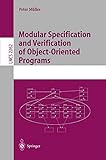Modular Specification and Verification of Object-Oriented Programs [electronic resource] / edited by Peter Müller.
Material type: TextSeries: Lecture Notes in Computer Science ; 2262Publisher: Berlin, Heidelberg : Springer Berlin Heidelberg, 2002Description: XIV, 298 p. online resourceContent type: text Media type: computer Carrier type: online resourceISBN: 9783540456513Subject(s): Computer science | Software engineering | Logic design | Computer Science | Software Engineering | Logics and Meanings of Programs | Programming Languages, Compilers, Interpreters | Programming TechniquesAdditional physical formats: Printed edition:: No titleDDC classification: 005.1 LOC classification: QA76.758Online resources: Click here to access online
TextSeries: Lecture Notes in Computer Science ; 2262Publisher: Berlin, Heidelberg : Springer Berlin Heidelberg, 2002Description: XIV, 298 p. online resourceContent type: text Media type: computer Carrier type: online resourceISBN: 9783540456513Subject(s): Computer science | Software engineering | Logic design | Computer Science | Software Engineering | Logics and Meanings of Programs | Programming Languages, Compilers, Interpreters | Programming TechniquesAdditional physical formats: Printed edition:: No titleDDC classification: 005.1 LOC classification: QA76.758Online resources: Click here to access online  E-BOOKS
E-BOOKS
| Current library | Home library | Call number | Materials specified | URL | Status | Date due | Barcode |
|---|---|---|---|---|---|---|---|
| IMSc Library | IMSc Library | Link to resource | Available | EBK5500 |
Mojave and the Universe Type System -- The Semantics of Mojave -- Modular Specification and Verification of Functional Behavior -- Modular Specification and Verification of Frame Properties -- Modular Specification and Verification of Type Invariants -- Conclusion -- Formal Background and Notations -- Predefined Type Declarations -- Examples -- Auxiliary Lemmas, Proofs, and Models.
Software systems play an increasingly important role in modern societies. Smart cards for personal identi?cation, e-banking, software-controlled me- cal tools, airbags in cars, and autopilots for aircraft control are only some examples that illustrate how everyday life depends on the good behavior of software. Consequently, techniques and methods for the development of hi- quality, dependable software systems are a central research topic in computer science. A fundamental approach to this area is to use formal speci?cation and veri?cation. Speci?cation languages allow one to describe the crucial p- perties of software systems in an abstract, mathematically precise, and implementation-independent way. By formal veri?cation, one can then prove that an implementation really has the desired, speci?ed properties. Although this formal methods approach has been a research topic for more than 30 years, its practical success is still restricted to domains in which devel- ment costs are of minor importance. Two aspects are crucial to widen the application area of formal methods: – Formal speci?cation techniques have to be smoothly integrated into the software and program development process. – The techniques have to be applicable to reusable software components. This way, the quality gain can be exploited for more than one system, thereby justifying the higher development costs. Starting from these considerations, Peter Muller ¨ has developed new te- niques for the formal speci?cation and veri?cation of object-oriented so- ware. The speci?cation techniques are declarative and implementati- independent. They can be used for object-oriented design and programming.


There are no comments on this title.